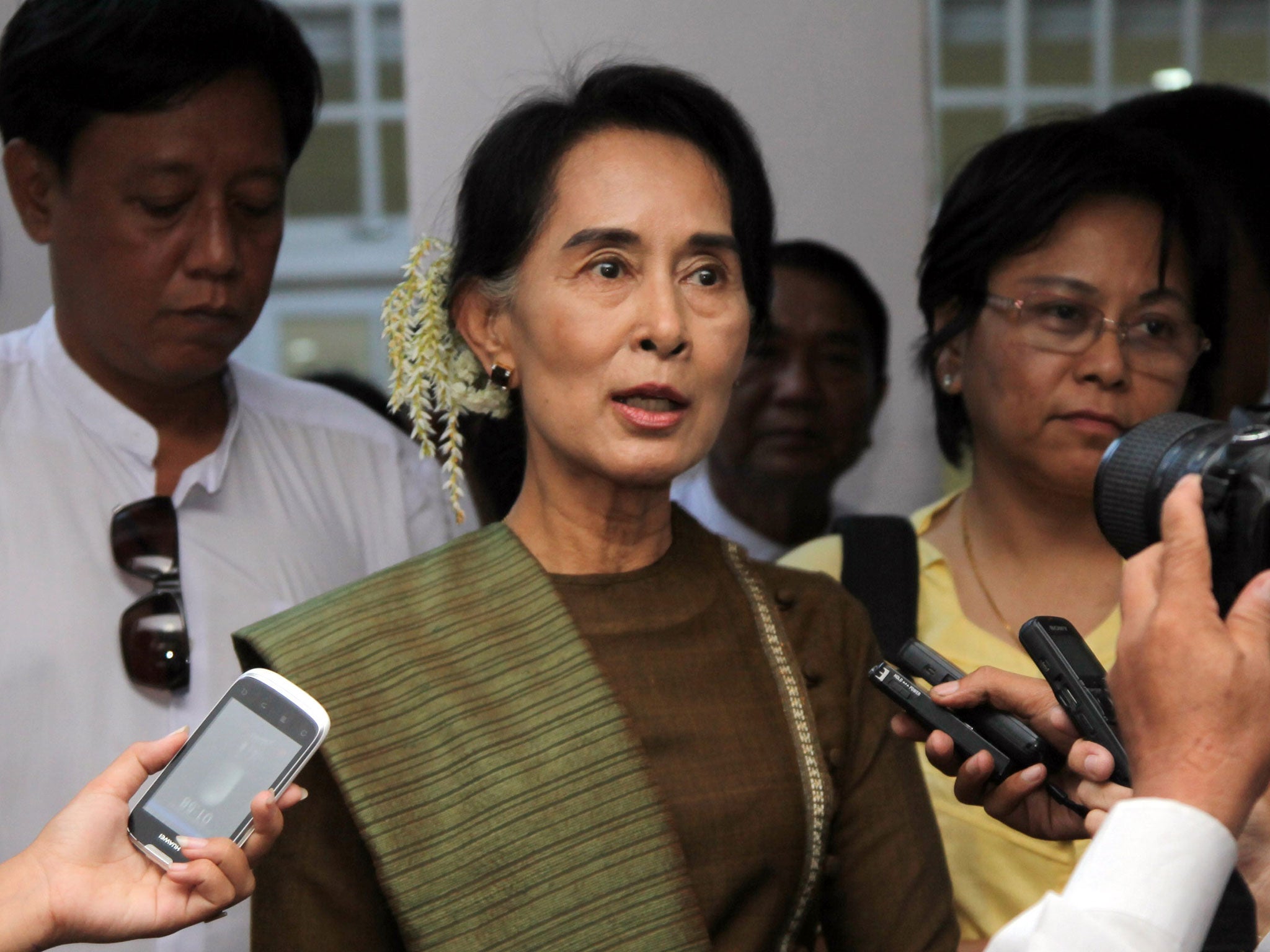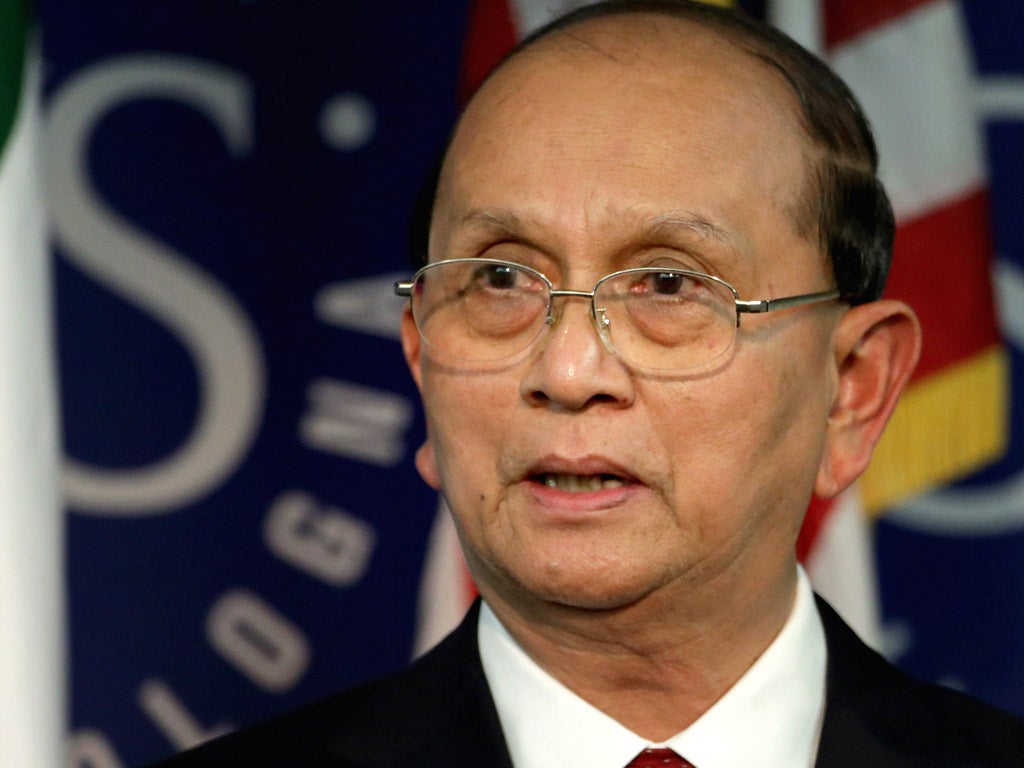Until Aung San Suu Kyi can run for President, Burma is no democracy
If the military blocks constitutional change, the world will want to know why

Your support helps us to tell the story
From reproductive rights to climate change to Big Tech, The Independent is on the ground when the story is developing. Whether it's investigating the financials of Elon Musk's pro-Trump PAC or producing our latest documentary, 'The A Word', which shines a light on the American women fighting for reproductive rights, we know how important it is to parse out the facts from the messaging.
At such a critical moment in US history, we need reporters on the ground. Your donation allows us to keep sending journalists to speak to both sides of the story.
The Independent is trusted by Americans across the entire political spectrum. And unlike many other quality news outlets, we choose not to lock Americans out of our reporting and analysis with paywalls. We believe quality journalism should be available to everyone, paid for by those who can afford it.
Your support makes all the difference.There is an election in 2015 that will be a milestone. It has the potential to change the lives of millions, to encourage economic development and to demonstrate the power of democratic reforms. Yet the most popular politician will be barred from standing. To which vote am I referring? The election is for the office of President, the country is Burma and the politician is Aung San Suu Kyi.
It is rare for the Speaker of the Commons to comment publicly on anything relating to policy but being in the business of democracy, and having been actively interested in Burma for many years, I can stay silent no longer.
Burma’s constitution, perhaps uniquely, bars those whose children have foreign citizenship from becoming President. This provision was almost certainly a deliberate attempt to block Suu Kyi, the most popular politician, from seeking the presidency, as her adult children have British citizenship. If Burma is truly committed to democratic reform, this bar needs to be removed.
Over the last three years, there have been remarkable and welcome moves towards democracy. Hundreds of political prisoners – including Suu Kyi – have been released from jail or house arrest. The government has committed to political dialogue with ethnic armed groups. The press is now largely free from censorship. I saw these changes for myself when I visited, in July 2013, and met, amongst others, both Suu Kyi and President Thein Sein.
In June 2013, Burma’s parliament set up a committee to review the much-criticised constitution. This committee, dominated by the ruling USDP party and the military, is expected to recommend amendments this month that will have a strong bearing on the future of the country’s reform process.
The current constitution maintains the central role of Burma’s military in politics. One in four seats is reserved for unelected military officers, who have a veto over constitutional change. Surely this is not right in a democracy? The constitution also denies ethnic minorities the right to determine even their most basic affairs. This also must change: genuine federalism is essential to Burma’s long-term future.
Yet, for me, the simplest and most urgent reform needed ahead of the 2015 election is the Presidential eligibility clause. Now is the time to speak out about a matter that is urgent and morally serious – the right for Suu Kyi to run for President.
Amending this clause is the right thing to do, not for the benefit of any one specific individual, but because in a democracy the most popular political figure should have the right to try to become the leader of the country. As David Cameron has noted, without this change, Burma’s elections will not be considered free and fair.
It is greatly to the credit of Parliamentary Speaker Thura U Shwe Mann that he has publicly made clear his support for amending the eligibility clause. His position is remarkable because, as USDP Chairman, he is likely to be Suu Kyi’s main rival in 2015. His desire to compete on a level playing-field shows a very British sense of fair play.
Unfortunately, even the support of Shwe Mann is not enough. For constitutional change to become a reality, Burma’s military, with its veto power, must give the go-ahead. The decision of one man, Commander-in-Chief Senior General Min Aung Hlaing, will be crucial. Despite his critical role, his public comments on constitutional reform have been limited. Now is his opportunity to demonstrate extraordinary leadership; to lay down a legacy that will stand the test of time; to be the general that led Burma’s military out of politics.
The Burmese military cannot dodge its responsibilities. If it chooses to block constitutional amendments, the world will demand to know why. Today, Western militaries, including Britain’s, are cautiously exploring engagement with Burma. If the Burmese military is seen to block progress, there will be heavy pressure for military-military engagement to be reconsidered.

There is one other figure with a role to play: Burma’s current leader, Thein Sein. In his New Year’s message, the President for the first time took a public stance, declaring he “did not want restrictions imposed on the right of any citizen to become leader of the country” (albeit with the ambiguous caveat that “necessary measures” would need to be in place to defend “national interests”).
The President’s readiness to embrace change is welcome, but his apparent hedging is not. He must make a clear commitment to the unconditional right for any MP to stand. The credibility of his own reform process is at stake. It is time for him to exert his moral and practical authority in support of continued democratic change.
Without genuine constitutional reform that allows the will of the people to be reflected in the leadership of the country, the Burmese Spring will take on a distinct chill. The world is watching Burma closely.
John Bewcow is the right honourable speaker of the parliament of the United Kingdom.
Join our commenting forum
Join thought-provoking conversations, follow other Independent readers and see their replies
Comments